Politics
A reform that was overdue (Column: The Third Eye)

New Delhi: India, under the regime of Prime Minister Narendra Modi, has achieved a rare success in emerging as a world power whose voice mattered on the issues of global peace and economic advancement.
However, in the area of internal governance, the country’s image was getting somewhat marred primarily because law and order – a subject exclusively falling in the ambit of responsibility of state governments – was not being handled well for a variety of reasons of which ‘politicisation’ of police was perhaps the most important.
At regular intervals, cases of public violence of the kind that demonstrated a complete lack of fear of the law, occurred in one state or the other and heinous offences against women including a girl child that should shake the conscience of the nation, threatened to become an ugly trend.
A voice for police reforms was consistently raised, a debate was set in motion about the share of responsibility of the police leadership that was by and large in the hands of IPS officers and even the highest judiciary of the land had played a helpful part by laying down guidelines on the crucial matter of appointment of the Director General of Police (DGP) of the state.
In no other major country is a career in police offered – through a merit-based national level examination prescribed for the educated lot, for selecting IPS officers – in which a young man or woman was launched at the leadership level within a couple of years after the initial service training, to manage and be on the front line of the thousands of Police personnel who served the state and the district.
Maintenance of law and order is the first duty of the state regardless of the political complexion of the ruling elite and the law recognised the investigation of a cognizable crime as a sovereign function of the Police. And yet if the state machinery failed often on that front, people must wake up to the threat that this posed to the democratic system itself.
It is in this context that Home Minister Amit Shah deserves a huge round of applause for tabling a comprehensive set of reforms in Parliament in respect of the basic legal framework contained in IPC, CRPC and Indian Evidence Act – in the spirit of highlighting the need for a sovereign nation like India to adopt an integral Code of law of its own, appropriately disowning any ‘colonial’ legacies and ensuring a uniform system of law and order management throughout the length and breadth of this country.
He apparently set in motion an in-depth examination of this huge task a long time ago. It is now incumbent on all Indians to take a deep interest in the future debates in Parliament whenever the proposed laws come up there for discussion.
The laws have to be ‘strong’ in the first instance but their implementation also has to be just and ‘untainted’.
The police leadership has to be professionally effective to ensure that the handling of order and law both is impartial – being protective of the law-abiding citizens and capable of producing deterrence for the law-breakers.
While a detailed examination of the new proposed laws would be going on, one has to appreciate the political boldness and recognition of national concern shown by the Union Home Minister, in proposing the death sentence for the rape of a minor as also for ‘lynching’ which is a crime where a mob beats an individual to death.
Moreover, considering the fact of anti-India lobbies and misuse of social media becoming an instrument of ‘proxy war’ against this country, there was an urgent need to expand the law to take care of many ‘covert’ threats posed to India in the new age we live in.
Of course, the execution of any law has to be evidence-based and if the use of digital media was made for causing subversion, fostering terrorism and inciting separatist violence, admissibility of evidence has to include digital channels as well.
There are strong laws available for dealing with hate speeches that incited communal discord but their implementation was not as prompt – one inadequacy was about the inability of the police to produce the ‘record’ of the speech as evidence.
The merit of the proposed new laws is that they cater to the developing national and international scene and fill many legal gaps in the state’s wherewithal to protect citizens against internal and external threats and thus provide a strong base for the dispensation of justice.
The creation of strong laws has to go with the exercise of reinforcing the police leadership to ensure impartial management of law and order and improve the working of police stations which are the establishment of legal authority closest to the citizens.
Officers of the Indian Police Service like the IAS, are recruited, trained and allocated to the states by the Centre and there is no reason why through mid-service orientation programmes organised by the MHA on a national basis at different Academies and the Rashtriya Raksha University (RRU) and through the instrumentality of DoP&T which kept track of the performance of both IAS and IPS an effective oversight of the Centre could not be maintained on these services for the national good.
The Centre would have a legitimate role in the appointment of DGP if the process of selection for the post prescribed that this would be made only out of the panel of three drawn by UPSC on the basis of seniority-cum-merit, in consultation with the state government. This should be pursued on a more vigorous note as this process had already been supported by the Supreme Court itself. There should be zero tolerance towards death in Police custody or the use of ‘Third Degree’ in police interrogation.
The persistent malady of police stations not registering a complaint of a cognizable offence has kept the image of police stations low in the eyes of citizens.
In the CRPC, it is clearly laid down that all senior officers enjoyed the power of Station House Officer throughout their respective jurisdiction which was an affirmation that IPS officers were expected to oversee and improve the working of the police station. This unfortunately had not been achieved to the desired extent during the long existence of this service.
It is a matter of great satisfaction that in the proposed new legal Code, there are provisions of Zero FIR, online receipt of complaints and admissibility of evidence recorded in digital media.
The Union Home Minister has shown a good perception of the need to make the investigation more scientific in prescribing that the visit of the Forensic Team to the scene of crime would be mandatory in certain cases.
It goes without saying that a far greater allocation of funds was needed to ensure all of this – in times of Home Minister Amit Shah the work of modernisation of Police had been stepped up, particularly in the field of computerisation and speedy communication.
There are three areas of criminality that the country’s Penal Code had to still work on – they represent the unhappy outcome of the mismatch that had been created between a competitive material advancement and the sociological progress that should go with it.
Of these three, one is the obnoxious ‘ragging’ in educational institutions of higher learning that resulted in suicides in many cases.
Acts of criminality in the name of ragging were totally unacceptable and a set of laws should be framed that put a basic share of responsibility for the same on the head of that institution as well.
Ragging began in Medical Colleges as a practice devised to make the freshers familiar with the seniors with whom the former had to work closely as a team and it was totally free of anything that amounted to the use of physical force.
The subsequent degeneration of ‘ragging’ as a phenomenon in which the ‘goons’ of the institution had a field day, calls for enactment of specific laws against what clearly had become a criminal activity.
The second cause for concern – essentially a case of corruption resulting from the decay of moral values – is the growing frequency of leakage of question papers of competitive examinations, by those who were a part of the controlling mechanism.
A separate law is needed to prevent such scams.
And finally, the rising graph of induction of children in beggary in metropolitan centres, in particular, needs to be taken note of – not only from the angle of poverty alleviation but more importantly for the likelihood of this having been made a ‘cartel’ activity.
There should be a separate listing of this serious crime with exemplary punishment and police should use Intelligence techniques like surveillance to reach the culprits.
All of these new kinds of criminal conduct damage the image of the country, contribute to social destabilisation and tend to grow in the absence of an effective deterrent. It might be useful for the MHA to get BPR&D to urgently examine this matter as a prelude to the introduction of new laws.
In the time of Home Minister Amit Shah, serious efforts are being made to strengthen internal security against the new threats materialising through misuse of social media and other covert means.
The frequency of gruesome murders, attacks on women and cases of public violence add up to creating an impression of lawlessness that does not do credit to democratic governance.
Failures of state governments and state police are spoiling India’s national image before the world as the outsiders did not understand the federal system of this country that gave total control to the state over the police and made the Centre somewhat of a mere observer.
The deterrent punishment provided by the proposed laws for certain crimes no doubt will help but it is the efficient and quick investigation of offences that would hold the key to success on this front – a lot of improvement was needed there. State governments have to spend more to bring the Police-Public ratio closer to normal.
The focus of policing has to be on police stations – the country should demonstrate this by appointing gazetted officers as Station House Officers who would be assisted by Inspectors and Sub Inspectors in various spheres of duty. This would dispense with the old practise of posting Circle Officers to oversee the SHOs, a contingent of District Armed Police should be stationed at sensitive police stations so that Para Military Forces would be needed only in serious emergencies.
The staff of the District Intelligence Unit should be specifically assigned to important police stations.
Adequate mobility for visiting the ‘scene of occurrence’ has to be there- this remains a glaring weakness even now. Hospitals and public clinics must respond to any sudden requests emanating from the District SP. There should be no hesitation about invoking Art 311 of the Constitution against a ‘rogue’ policeman.
For IPS officers who lead the Police forces of states, the Centre should reinforce the arrangement that protects them from any politically motivated action initiated by a state government against them. By the same logic however, Centre should also be in a position to reprimand an IPS officer for proven incompetence, political taint or failure to play his or her part in a situation of duty.
Strong laws, their impartial implementation and consensus among the politicians to keep law and order and internal security above party politics, are the three requirements of the eco-system that should be created to keep democratic governance going.
(The writer is a former Director of the Intelligence Bureau. Views expressed are personal)
Politics
6,939 patients awaiting organ transplants in TN: Health Minister
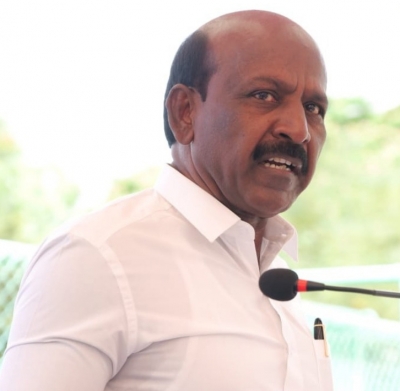
Chennai, Feb 3 (IANS) Tamil Nadu Health Minister Ma Subramanian on Saturday said that 6,939 people of the state were waiting for organ transplantation.
In a statement, he said that 6,266 patients were waiting for kidney transplantation, 400 for liver, 62 for heart, 25 for heart and lung, 27 for hands, two for small bowel,41 for kidney and liver, 42 for kidney and pancreas, two for pancreas and small bowel.
Subramanian also said that the state saw 32 brain dead organ donors since the start of this year, and added that organ donation has also increased in the state.
The minister also said that after Chief Minister M. K. Stalin had on September 23, 2023 announced State honours for funeral of brain dead donors, 4,097 persons have pledged to donate their organs.
The family of a 57-year-old man, who was declared brain dead at the Government Stanley Medical College Hospital, consented to donate his organs and the minister placed a wreath on his body.
Subramanian also said that government was planning to create more awareness about organ donation in the state and added that film and TV stars and sports personalities will be roped in as brand ambassadors to create awareness in the state on organ donation.
Politics
Stalin writes to DMK cadres to work hard for victory of INDIA bloc in LS polls
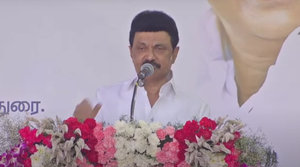
Chennai, Feb 3 (IANS) Chief Minister MK Stalin, who is on a trip to Spain to garner investment, has called upon the DMK cadres to work hard and ensure that the Indian National Developmental Inclusive Alliance (INDIA) win from all the 39 Lok Sabha seats in Tamil Nadu as well as the one seat in Puducherry.
In a letter to the cadres on Saturday on the occasion of the death anniversary of DMK ideologue and late Chief Minister of Tamil Nadu CN Annadurai, Stalin who is also the president of DMK, exhorted the cadres not to rest until the INDIA bloc wins from all the seats of Tamil Nadu and Puducherry.
The death anniversary of CN Annadurai, fondly addressed as Anna in Tamil Nadu, falls on February 3 (Saturday).
Annadurai has an emotional connect with the DMK cadres as he was the first Chief Minister from the Dravidian party in Tamil Nadu.
Stalin in the letter said, “Go and tell the people about the achievements of the DMK government and how the BJP government at the Centre has betrayed Tamil Nadu.”
He also cautioned the cadres that the BJP and the AIADMK will engage in false propaganda against the party and called upon them not to get diverted by such tactics.
Stalin said, “Let us prove that we don’t fear anything through our field work.”
The Chief Minister also said that the Union Interim Budget had ignored Tamil Nadu and many other states.
He also expressed confidence that the INDIA bloc would form the next government at the Centre and autonomy of states would be safeguarded.
Politics
Delhi Police team again at Kejriwal’s residence to serve notice, CMO dubs it defamation tactic (Ld)
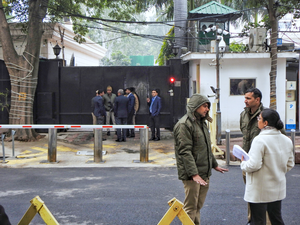
New Delhi, Feb 3 (IANS) A team of Delhi Police’s Crime Branch on Saturday morning again reached the residence of Chief Minister Arvind Kejriwal to serve him a notice in connection with a probe over his allegations that the BJP was trying to “buy” AAP MLAs.
Meanwhile, Delhi Chief Minister’s office said that they are ready to receive notice but police are not giving it, when we even told them that a “receiving” will be given.
“Police’s objective is not to serve notice but to defame,” said an CMO official.
A team of Delhi Police’s Crime Branch on Saturday morning again reached the residence of Chief Minister Arvind Kejriwal to serve him a notice in connection with the allegations that BJP was trying to “buy” AAP MLAs.
Sources said that the team had asked Kejriwal to provide evidence in the matter.
On Friday, as per sources, besides Kejriwal’s residence, the Crime Branch team also went to AAP Minister Atishi’s residence to serve a notice. However, the notices were not accepted at either location.
“Atishi was not at home, while Kejriwal was also not at home. The Crime Branch team is likely to come again tomorrow,” the sources said.
Meanwhile, Delhi BJP President Virendraa Sachdeva had said the saffron party welcomes reports of Crime Branch launching an inquiry into AAP’s allegations of the BJP “luring” AAP MLAs.
The Delhi BJP had filed a complaint on January 30, stating that it has made no such offer to AAP MLAs, while demanding a police inquiry into Kejriwal’s allegations.
Sachdeva had said that the Crime Branch has served a notice to Kejriwal, he should either submit evidence to support his allegations or be prepared to face criminal proceedings.
Politics
LK Advani to be conferred Bharat Ratna, announces PM Modi
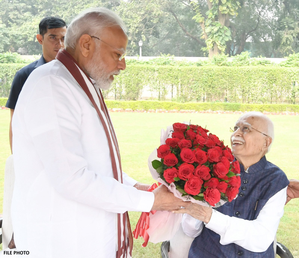
New Delhi, Feb 3 (IANS) Former Deputy Prime Minister Lal Krishna Advani will be conferred the Bharat Ratna, announced Prime Minister Narendra Modi on Saturday. A BJP stalwart, Advani is also the founding member of Bhartiya Janata Party (BJP).
Born on November 8, 1927, 96-year-old Advani served as the 7th Deputy Prime Minister of India from 2002 to 2004. He is the longest serving Minister of Home Affairs serving from 1998 to 2004. He is also the longest serving Leader of the Opposition in the Lok Sabha. He was the prime ministerial candidate of the BJP during the 2009 general election.
The Prime Minister took to his personal X handle to announce the highest civilian award for LK Advani and informed that he also congratulated the party veteran on being conferred with the nation’s highest civilian honour.
“I am very happy to share that LK Advani will be conferred the Bharat Ratna. I also spoke to him and congratulated him on being conferred this honour..,” PM Narendra Modi tweeted.
Notably, Bharat Ratna is the nation’s highest civilian award, given as a mark of recognition for exceptional & distinguished service.
Showering praises on the towering stature & exemplary leadership of BJP patriarch, PM Modi wrote, “One of the most respected statesmen of our times, his contribution to the development of India is monumental. His is a life that started from working at the grassroots to serving the nation as our Deputy Prime Minister. He distinguished himself as our Home Minister and I&B Minister as well.”
Advani is widely credited as one of the tallest leaders who scripted BJP’s rise from ‘oblivion to prominence’. It was after his Rath Yatra in 1990s that catapulted the saffron party into national politics.
For the unversed, LK Advani is the second BJP stalwart to be conferred with Bharat Ratna. Prior to him, former Prime Minister Atal Bihari Vajpayee was also honored with Bharat Ratna in 2015.
Politics
Jitan Ram Manjhi seeks two berths in new Nitish caninet
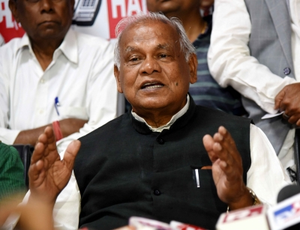
Patna, Feb 3 (IANS) Hindustani Awam Morcha-Secular chief Jitan Ram Manjhi has demanded two ministerial berths in the Nitish Kumar-led NDA government in Bihar.
“RJD offered me the post of Chief Minister but I refused it. Now, the NDA government is giving us only one berth in the cabinet which is absolutely wrong. I told Union Home Minister Amit Shah and MoS Home Nityanand Rai that our party needed two ministry portfolios,” Manjhi said on Friday.
The former Bihar Chief Minister further expressed displeasure “allotment of ministry portfolio” to independent MLA Sumit Sumit Singh.
“The Bihar government has made an independent MLA a cabinet minister and we also heard that he is getting the department as per his wish, which is absolutely wrong. I am objecting to it,” he said.
Manjhi sought cabinet berth for his party’s state President and MLA Anil Kumar, who belongs to the upper caste community.
“He (Anil Kumar) became MLA for the fourth time and it would be beneficial for our party if he would become the cabinet minister. Our party will become stronger in Magadh region on the social front if he becomes the cabinet minister,” the HAM-S chief said.
At the swearing-in ceremony of the new NDA government, Santosh Manjhi took the oath on January 28.
Reacting to the “delay in the distribution of ministries”, Manjhi said: “I have not seen anything like this in my political career of 44 years that a government was formed but the ministry portfolios were not allotted. The Chief Minister had said on the day of swearing-in ceremony that the cabinet expansion would take place within two to three days but it has not happened till now.”
The HAM-S chief also advocated for the review of liquor prohibition law. He said that his party has a longstanding demand to lift the ban or be implemented on the line of Gujarat.
“A large number of poor people consumed 250 to 300 ml liquor and are serving jail terms due to this law. Hence, we have demanded the liquor law should be implemented on the line of Gujarat,” he said.
-
Video2 years ago
PM Modi Attacks Congress in Karnataka with “Kerala Story”
-
Politics2 years ago
Siddaramaiah & DK Shivakumar sworn in as Chief Minister & Deputy CM respectively
-
Cricket2 years ago
CSK players rejoice 5th IPL title with their families (Pics)
-
Entertainment2 years ago
Karan Deol weds his longtime Girlfriend Drisha Acharya (Pics)
-
Entertainment2 years ago
Urvashi Rautela dazzles on Cannes 2023 red carpet (Pics)
-
Sports7 years ago
History Of Official FIFA WORLD CUP Match balls
-
Entertainment2 years ago
Sunny Leone gets ready for Kennedy premiere in Cannes (Pics)
-
India2 years ago
Ashwini Vaishnaw: Railway Board recommends CBI probe in the Odisha railway disaster


























